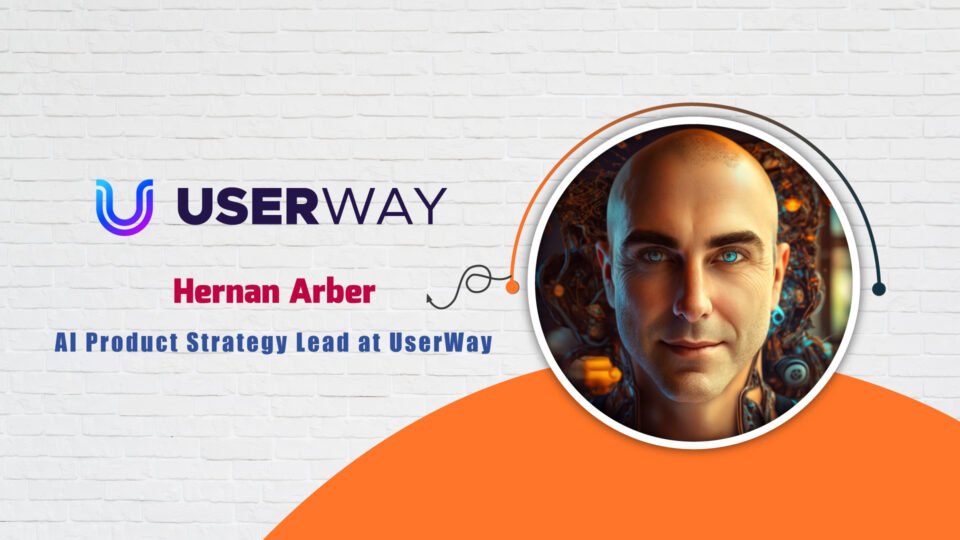Delve into the future of AI and accessibility with Hernan Arber, AI Product Strategy Lead at UserWay.
Could you please tell us about your background and how you entered the industry?
I am an entrepreneur, musician, and software engineer. I’ve had an extensive career in the startup industry spanning nearly two decades. I began my journey in the industry as a junior developer, and over time, I worked my way up to engineering director. Now, I lead the AI product strategy at UserWay.
While attending university, an interest in artificial intelligence sparked, so I focused on AI-based technologies and their applications. My thesis, “An AI-based Musical Sequencing System,” served as the culmination of my studies and earned me my Bachelor’s degree in computer science, and I’ve been delving deeper into AI ever since.
When it comes to product strategy and development, what is your approach? Can you guide us through your process, starting from the inception of the idea to the execution of FixMyCode.ai?
My approach to product strategy is relatively straightforward. I need to understand the data inputs and how we can optimize the sources. After processing these, I need to understand the required processes for this data and, finally, how we want to present the output in a user-friendly way that produces the WOW-Effect to offer a world-class experience. FixMyCode.ai originated internally at UserWay to help developers enhance website accessibility using AI. Over time, it evolved into the FixMyCode experience that is now available for everyone to use and enjoy for free. My involvement in FixMyCode focused on optimizing the processes, organizing the team, and working on the deployment stage, which included working on the UX and delivering the product to the world. Ultimately, the credit belongs to the team at UserWay.
UserWay’s mission is to make the digital world accessible. Specifically, how does FixMyCode contribute to advancing accessibility in web development?
It is crucial to make accessibility a priority at every stage of development to make the world more accessible. UserWay already offers the leading accessibility widget in the market, created for remediating violations on existing websites. FixMyCode.ai allows companies to shift left in their accessibility practices, playing a crucial role in advancing accessibility in web development by addressing the accessibility aspects at an earlier stage—the coding process.
By integrating FixMyCode into the web development process, developers can leverage the power of AI to identify potential accessibility issues in their code. The tool analyzes the codebase and provides recommendations for improving accessibility, ensuring that websites are designed with accessibility in mind. This proactive approach helps to prevent accessibility barriers and helps ensure that websites are inclusive and usable for a broader range of users, including those with disabilities.
By catching and addressing accessibility issues during the coding stage, FixMyCode empowers developers to create more accessible websites and applications. Importantly, this helps ensure that digital assets are accessible from their first version and not made accessible as an afterthought.
This early intervention saves time and effort that would otherwise be required to fix accessibility problems later in the development cycle or after the website has been deployed. It promotes an accessibility-first mindset in web development, where accessibility is a priority.
To ensure UserWay remains competitive, how do you stay up to date with industry trends and technological advancements?
To ensure UserWay remains competitive, I employ several strategies to stay current with industry trends, technological advancements, and the intersection between AI and accessibility.
I am deeply interested in AI and naturally drawn to staying updated on the latest AI trends. I actively follow industry news, participate in conferences, attend webinars, and read research papers. I can identify emerging AI technologies, techniques, and best practices that can enhance UserWay’s products and services by staying well-informed.
In addition, I rely heavily on the extensive knowledge the UserWay team has acquired and continues to do so to keep up to date with the latest findings in the accessibility space. By collaborating closely with the team, I tap into their insights and experiences to stay informed about the latest trends in accessibility. This collaborative approach ensures that we know essential advancements and innovations in the accessibility space.
At UserWay, how do you effectively manage roadmaps and strike a balance between short-term deliverables and long-term strategic goals?
For every company operating at a global scale, you grapple with striking a perfect balance between short-term KPIs and long-term company goals. I always keep the long-term vision in mind, even when focusing on the immediate deliverables that need handling, which allows me to understand the short-term deliverables align with the broader strategic objectives of UserWay. I like to design roadmaps by drawing upon my knowledge to ideate and identify potential initiatives. As the roadmap progresses, I rely heavily on user inputs and feedback. By involving end-users in the testing and evaluating of the product, we gain valuable insights into what works and what doesn’t. Combining early-stage ideation with user inputs and feedback allows us to meet immediate needs while advancing UserWay’s vision for the future.
Could you share any metrics or success indicators that demonstrate the positive impact FixMyCode has had on developers and their projects?
Certainly! FixMyCode debuted on Product Hunt and quickly ranked as the #1 Top Product of the Day and has received great reviews with fantastic feedback from developers at organizations of all sizes. Since then, our user base has grown extensively, and we now have over 5K returning users. We also see conversion through the thriving community we’ve built and launched alongside FixMyCode, the AI for Accessibility Community run through Discord. Any developer curious about becoming an accessibility a11y can join to learn more about accessible and ethical coding practices, and they have a community of support to assist them and expand their knowledge there.
As the leader behind FixMyCode, what were the major challenges you encountered during its development, and how did you overcome them?
One of the most significant challenges I encountered during FixMyCode’s development is the non-deterministic nature of an AI product based on a Large Language Model (LLM). To explain this in simpler terms, I’ll quote Forrest Gump in that AI “is like a box of chocolates. You never know what you are going to get!” It’s a real challenge when training an AI Model to act a certain way. You must be aware that sometimes AI will spit out some “rotten pieces” of information. The way to overcome this is to be very specific with the AI about the role it’s playing, the output format, the things you are looking for, and the significant things to avoid. You are also learning to accept that this is not a typical “if-else” algorithm. We must embrace the faults in AI to make the most of its power.
Can you discuss the future roadmap and vision for FixMyCode? Are there any upcoming features or enhancements you can share?
Without saying too much, we have a lot of new features and improvements in the pipeline, but for now, we want to observe, track, and learn what the user‘s experiences are like. Once enough observation is complete and adequate valuable data and insights are collected to understand the users of the tool better; we can make informed decisions on the following steps to improve and create new features. We can reduce the amount of guesswork by determining the following steps and making these calculating, well-educated steps forward.
Additionally, what is one key piece of advice you would like to offer to company leaders?
One critical piece of advice I would offer company leaders is prioritizing their understanding of their customers as much as possible. The better you know your customer, the better you can craft a great product that solves a real problem. We often see the best leaders in the space have a personal connection or have experienced the problem they are solving themselves. As a leader, be strict with yourself but patient with others, and try to be encouraging and supportive. Cultivating a positive vibe sets the tone for the entire team and positively impacts productivity and morale. Maintaining positive energy in the workspace is often as important as setting the tasks for the week.
Finally, as a product and developer evangelist, what do you find most rewarding about your role and the impact of FixMyCode?
As a product and developer evangelist, I find several aspects most rewarding about my role and the impact of FixMyCode. Working and collaborating with the world-class team at UserWay is incredibly rewarding. Every person I get to talk to and work with within UserWay is highly skilled in their respective areas, and they are also great to connect with on a personal level. The mission of our team and the company is so clear and vital that we never have to question why we are doing the work we do but rather ask why the rest of the world is doing this. For FixMyCode, being able to provide such an incredibly impactful tool where developers can take their code or even create new code from scratch that has accessibility built-in, we are fulfilling our mission of making the digital world more accessible.

Hernan Arber,
AI Product Strategy Lead at UserWay
Hernan Arber is the AI Product Strategy Lead at UserWay. He leads a multi-disciplinary team building cutting-edge AI tools for web accessibility. Hernan oversees the development and long-term outlook for Strategic AI Alignment. In addition, Hernan is a product and developer evangelist who recently led the charge to build UserWay’s latest developer tool FixMyCode. FixMyCode, is the first coding assistant trained in digital accessibility and ADA compliance.

